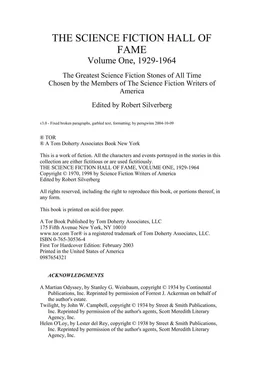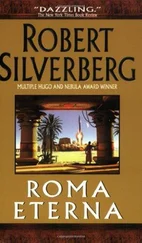For one thing, the ceiling was vaulted and corbeled; for another, there were side-columns with reverse flutings; for another—oh hell! The place was big. Posh. You could never have guessed it from the shaggy outsides.
I bent forward to study the gilt filigree on a ceremonial table. M'Cwyie seemed a bit smug at my intentness, but I'd still have hated to play poker with her.
The table was loaded with books.
With my toe, I traced a mosaic on the floor.
"Is your entire city within this one building?"
"Yes, it goes far back into the mountain."
"I see," I said, seeing nothing.
I couldn't ask her for a conducted tour, yet.
She moved to a small stool by the table.
"Shall we begin your friendship with the High Tongue?"
I was trying to photograph the hall with my eyes, knowing I would have to get a camera in here, somehow, sooner or later. I tore my gaze from a statuette and nodded, hard.
"Yes, introduce me."
I sat down.
For the next three weeks alphabet-bugs chased each other behind my eyelids whenever I tried to sleep. The sky was an unclouded pool of turquoise that rippled calligraphies whenever I swept my eyes across it. I drank quarts of coffee while I worked and mixed cocktails of Benzedrine and champagne for my coffee breaks.
M'Cwyie tutored me two hours every morning, and occasionally for another two in the evening. I spent an additional fourteen hours a day on my own, once I had gotten up sufficient momentum to go ahead alone.
And at night the elevator of time dropped me to its bottom floors I was six again, learning my Hebrew, Greek, Latin, and Aramaic. I was ten, sneaking peeks at the Iliad. When Daddy wasn't spreading hellfire brimstone, and brotherly love, he was teaching me to dig the Word, like in the original.
Lord! There are so many originals and so many words! When I was twelve I started pointing out the little differences between what he was preaching and what I was reading.
The fundamentalist vigor of his reply brooked no debate. It was worse than any beating. I kept my mouth shut after that and learned to appreciate Old Testament poetry.
—Lord, I am sorry! Daddy—Sir—I am sorry!—It couldn't be! It couldn't be....
On the day the boy graduated from high school, with the French, | German, Spanish, and Latin awards, Dad Gallinger had told his fourteen-year-old, six-foot scarecrow of a son that he wanted him to enter the ministry. I remember how his son was evasive:
"Sir," he had said, "I'd sort of like to study on my own for a year or so, and then take pre-theology courses at some liberal arts university. I feel I'm still sort of young to try a seminary, straight off."
The Voice of God: "But you have the gift of tongues, my son. You can preach the Gospel in all the lands of Babel. You were born to be a missionary. You say you are young, but time is rushing by you like a whirlwind. Start early, and you will enjoy added years of service."
The added years of service were so many added tails to the cat repeatedly laid on my back. I can't see his face now; I never can. Maybe it is because I was always afraid to look at it then.
And years later, when he was dead, and laid out, in black, amidst bouquets, amidst weeping congregationalists, amidst prayers, red faces, handkerchiefs, hands patting your shoulders, solemn faced comforters. I looked at him and did not recognize him.
We had met nine months before my birth, this stranger and I. He had never been cruel—stern, demanding, with contempt for everyone's shortcomings—but never cruel. He was also all that I had had of a mother. And brothers. And sisters. He had tolerated my three years at St. John's, possibly because of its name, never knowing how liberal and delightful a place it really was.
But I never knew him, and the man atop the catafalque demanded nothing now; I was free not to preach the Word: But now I wanted to, in a different way. I wanted to preach a word that I could never have voiced while he lived.
I did not return for my senior year in the fall. I had a small inheritance coming, and a bit of trouble getting control of it, since I was still under eighteen. But I managed.
It was Greenwich Village I finally settled upon.
Not telling any well-meaning parishioners my new address, I entered into a daily routine of writing poetry and teaching myself Japanese and Hindustani. I grew a fiery beard, drank espresso, and learned to play chess. I wanted to try a couple of the other paths to salvation.
After that, it was two years in India with the Old Peace Corps— which broke me of my Buddhism, and gave me my Pipes of Krishna lyrics and the Pulitzer they deserved.
Then back to the States for my degree, grad work in linguistics, and more prizes.
Then one day a ship went to Mars. The vessel settling in its New Mexico nest of fires contained a new language. —It was fantastic, exotic, and esthetically overpowering. After I had learned all there was to know about it, and written my book, I was famous in new circles:
"Go, Gallinger. Dip your bucket in the well, and bring us a drink of Mars, Go, learn another world—but remain aloof, rail at it gently like Auden—and hand us its soul in iambics.''
And I came to the land where the sun is a tarnished penny, where the wind is a whip, where two moons play at hot rod games, and a hell of sand gives you the incendiary itches whenever you look at it.
I rose from my twistings on the bunk and crossed the darkened cabin to a port.
The desert was a carpet of endless orange, bulging from the sweepings of centuries beneath it.
"I a stranger, unafraid— This is the land— I've got it made!"
I laughed.
I had the High Tongue by the tail already—or the roots, if you want your puns anatomical, as well as correct.
The High and Low Tongues were not so dissimilar as they had first seemed. I had enough of the one to get me through the murkier part of the other. I had the grammar and all the commoner irregular verbs down cold; the dictionary 1 was constructing grew by the day, like a tulip, and would bloom shortly. Every time I played the tapes the stem lengthened.
Now was the time to tax my ingenuity, to really drive the lessons home. I had purposely refrained from plunging into the major texts until I could do justice to them. I had been reading minor commentaries, bits of verse, fragments of history.
And one thing had impressed me strongly in all that I read.
They wrote about concrete things: rock, sand, water, winds; and the tenor couched within these elemental symbols was fiercely pessimistic. It reminded me of some Buddhist texts, but even more so, I realized from my recent recherches, it was like parts of the Old Testament. Specifically, it reminded me of the Book of Ecclesiastes.
That, then, would be it. The sentiment, as well as the vocabulary, was so similar that it would be a perfect exercise. Like putting Poe into French. I would never be a convert to the Way of Malann, but I would show them that an Earthman had once thought the same thoughts, felt similarly.
I switched on my desk lamp and sought King James amidst my books.
Vanity of vanities, saith the Preacher, vanity of vanities; all is vanity. What profit hath a man...
My progress seemed to startle M'Cwyie. She peered at me, like Sartre's Other, across the tabletop. I ran through a chapter in the Book of Locar. I didn't look up, but I could feel the tight net her eyes were working about my head, shoulders, and rapid hands. I turned another page.
Was she weighing the net, judging the size of the catch? And what for? The books said nothing of fishers on Mars. Especially of men. They said that some god named Malann had spat, or had done something disgusting (depending on the version you read), and that life had gotten underway as a disease in inorganic matter. They said that movement was its first law, its first law, and that the dance was the only legitimate reply to the inorganic ... the dance's quality its justification,—fication • •.
Читать дальше












